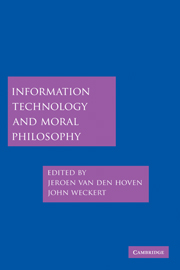Book contents
- Frontmatter
- Contents
- List of Contributors
- Introduction
- 1 Norbert Wiener and the Rise of Information Ethics
- 2 Why We Need Better Ethics for Emerging Technologies
- 3 Information Ethics: Its Nature and Scope
- 4 The Transformation of the Public Sphere: Political Authority, Communicative Freedom, and Internet Publics
- 5 Democracy and the Internet
- 6 The Social Epistemology of Blogging
- 7 Plural Selves and Relational Identity: Intimacy and Privacy Online
- 8 Identity and Information Technology
- 9 Trust, Reliance, and the Internet
- 10 Esteem, Identifiability, and the Internet
- 11 Culture and Global Networks: Hope for a Global Ethics?
- 12 Collective Responsibility and Information and Communication Technology
- 13 Computers as Surrogate Agents
- 14 Moral Philosophy, Information Technology, and Copyright: The Grokster Case
- 15 Information Technology, Privacy, and the Protection of Personal Data
- 16 Embodying Values in Technology: Theory and Practice
- 17 Information Technology Research Ethics
- 18 Distributive Justice and the Value of Information: A (Broadly) Rawlsian Approach
- Select Bibliography
- Index
- References
8 - Identity and Information Technology
Published online by Cambridge University Press: 21 July 2009
- Frontmatter
- Contents
- List of Contributors
- Introduction
- 1 Norbert Wiener and the Rise of Information Ethics
- 2 Why We Need Better Ethics for Emerging Technologies
- 3 Information Ethics: Its Nature and Scope
- 4 The Transformation of the Public Sphere: Political Authority, Communicative Freedom, and Internet Publics
- 5 Democracy and the Internet
- 6 The Social Epistemology of Blogging
- 7 Plural Selves and Relational Identity: Intimacy and Privacy Online
- 8 Identity and Information Technology
- 9 Trust, Reliance, and the Internet
- 10 Esteem, Identifiability, and the Internet
- 11 Culture and Global Networks: Hope for a Global Ethics?
- 12 Collective Responsibility and Information and Communication Technology
- 13 Computers as Surrogate Agents
- 14 Moral Philosophy, Information Technology, and Copyright: The Grokster Case
- 15 Information Technology, Privacy, and the Protection of Personal Data
- 16 Embodying Values in Technology: Theory and Practice
- 17 Information Technology Research Ethics
- 18 Distributive Justice and the Value of Information: A (Broadly) Rawlsian Approach
- Select Bibliography
- Index
- References
Summary
INTRODUCTION
Advances in information technology (IT) should focus our attention onto the notion of personal identity. In this chapter, I consider the effects of IT on identity by focusing on two broad areas. First, the online environment provides a new virtual space in which persons interact almost exclusively via their computer terminals. What are the effects of this new space on our self-conceptions? In particular, given that such a large chunk of our work and recreational time is spent in a ‘disembodied’ mode online, how does this affect the ways human persons interact with one another and the kinds of persons we become as a consequence of those online relationships? Second, technological advances now and in the future raise the spectre of cyborgisation, the idea that human beings are subject to having their body parts replaced, enhanced, or added to. How might this affect the ways human beings respond to one another and how might these changed relations come to alter our self-image? This chapter will explore the notion of personal identity in the light of these actual and potential technological developments.
In the philosophical literature the concept of personal identity is used in two quite separate ways. The question of personal identity over time is a question about what makes an individual person considered at one time the same as one considered at another time. This question is sometimes put in terms of the conditions under which a person persists over time, or survives through some process.
- Type
- Chapter
- Information
- Information Technology and Moral Philosophy , pp. 142 - 160Publisher: Cambridge University PressPrint publication year: 2008
References
- 9
- Cited by



